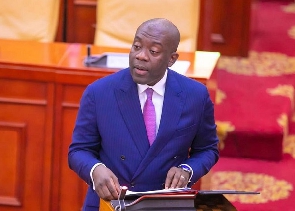 Information Minister, Kojo Oppong-Nkrumah
Information Minister, Kojo Oppong-Nkrumah
Information Minister Kojo Oppong-Nkrumah has praised the government's reduction of GH¢21 billion in the 2023 fiscal year's appropriation.
Speaking on the floor of parliament after Finance Minister Ken Ofori-Atta presented the mid-year budget on 31 July 2023, Mr. Nkrumah noted that while some call for further budget cuts, the mid-year reduction is a positive step.
The Information Minister emphasised the significance of fiscal discipline and staying within deficit constraints as demonstrated by the GH¢21 billion reduction in government expenditure.
He acknowledged that part of the reduction was allocated to interest payments but highlighted the government's determination to streamline financial resources and prioritise development initiatives.
"I think one of the first things to note is that the appropriation has been reduced by GH¢21 billion and I think for those who pay attention to fiscal policy or to the fiscal framework, that is a good thing except that GH¢10 billion of that is somewhere around interest payment and the rest is spread across the various expenditure lines", he pointed out.
"Nonetheless", the Ofoase-Ayirebi MP noted, "it’s a reduction in the appropriation of the government expenditure and I think that it is something that should give people some comfort that we are doing well to stay within the deficit constraints that we have imposed upon ourselves".
Mr Oppong Nkrumah also said there were some lessons to be learned moving forward, and "one of them, for example, deals with bolstering the relative stability that the [finance] minister speaks about".
The mid-year budget review allowed for an assessment of Ghana's economic performance and alignment of fiscal policies with national development priorities.
The reduction in government expenditure was achieved through the successful Domestic Debt Exchange Programme (DDEP), creating fiscal space for growth-enhancing reforms and managing rising debt costs.
The budget review also emphasised the government's growth agenda, prioritising inclusive development and private-sector investments to stimulate job creation and sustainable economic growth.
Initiatives like the Planting for Food and Jobs (PFJ) Phase II aim to strengthen agriculture, provide opportunities for the youth, and foster economic diversification.